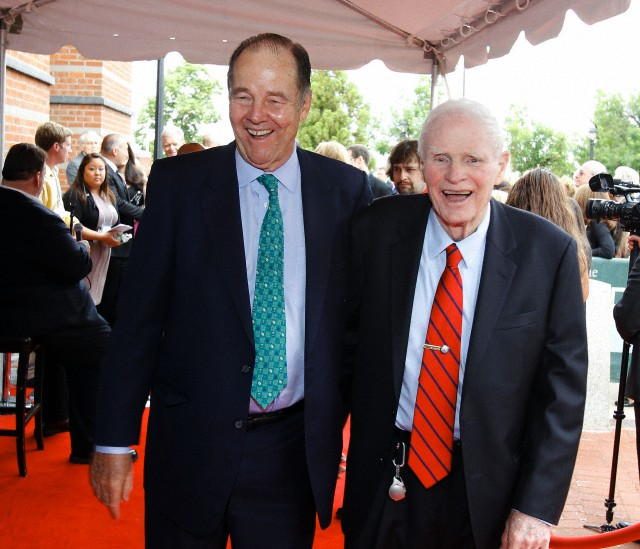
Brendan Byrne remains one of New Jersey’s most intriguing public figures. At 90, he is still a public presence, telling jokes, shaking hands, offering commentary (from his Democratic point of view) and disagreeing with his friend and fellow former governor, Thomas Kean, a Republican. Byrne served as governor from 1974 to 1982. Among his achievements: the institution of the statewide income tax. How did he get this controversial measure through a reluctant legislature in 1976? That is one of the questions explored in New Jersey Governor Brendan Byrne: The Man Who Couldn’t Be Bought, a new book by Donald Linky, who served in Byrne’s administration as counsel to the governor and director of the governor’s office of policy and planning.
I recently talked with Linky about his book and its fascinating subject.
What’s the story behind your subtitle: “The Man Who Couldn’t Be Bought”?
When Byrne was Essex County prosecutor, the FBI was eavesdropping on meetings of organized crime figures, primarily in Essex County. During the course of a trial years later, the transcripts of the FBI surveillance were publicly disclosed. In the conversations recorded by the FBI, the mobsters said that Byrne, as prosecutor, was a “Boy Scout,” and that it was futile, unlike other New Jersey officials at the time, to try to corrupt him. The description of Byrne as “the man who couldn’t be bought” was modified from a headline published in the New York Post reporting on the release of those transcripts.
How did Byrne fare when it came to working with Republicans in Trenton?
He always had a pretty decent relationship with the Republicans. They differed, of course, but in the years he was governor, it was a much less partisan time. Republicans and Democrats would attack each other’s positions during public debates and in the legislative chambers, but a lot of times after the cameras were off they would go out across party lines together and have dinner.
What are the roots of the Byrne-Kean friendship?
It goes back to when Byrne was head of the Public Utilities Commission. He got close to Kean’s brother who was the chief executive of a major utility, so there was a relationship that started way back then…When Kean lost the primary to Ray Bateman in ’77 and gave up his Assembly seat, Byrne later appointed him to the board of the state Highway Authority, which gave him a continuing public role.
What was Byrne’s role as governor in overseeing the recount in the 1981 election between Tom Kean and Jim Florio?
The election was so close that there was a recount which continued for weeks. I was with Byrne on election night watching the returns and the Camden County vote still had not been reported when nearly all other counties had filed their returns. Byrne ordered Clinton Pagano, head of the state police, to seize the machines in Camden County. I don’t think he was sure he had the legal authority to do that, but he made the decision because he knew it had to be done to maintain public confidence in the results of the election. Kean appreciated that, and also the professional way that Byrne’s attorney general, Jim Zazzali, and Michael Cole, the assistant attorney general, oversaw the recount in the following weeks—which resulted in Kean being declared as the winner of the election by some 1,700 votes.
What will Brendan Byrne be best remembered for?
The public probably associates him primarily with the income tax. However, he personally feels his most significant accomplishment was the preservation of the Pinelands. I agree with that. The Pinelands program, which established controls on construction in over a fifth of the state’s land area, set the development of South Jersey on a really different course. It has had and will continue to have a major impact on how New Jersey will develop in the future.



